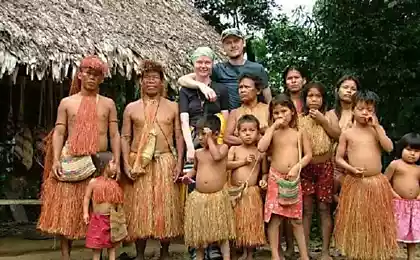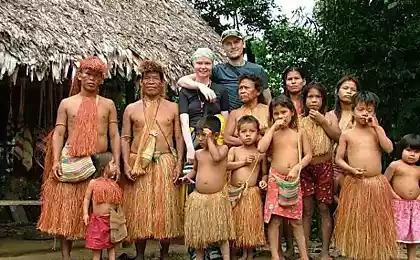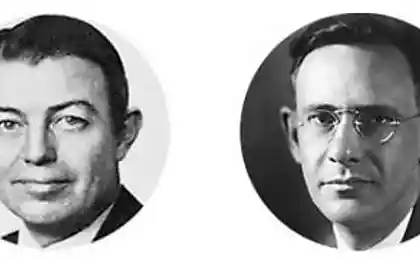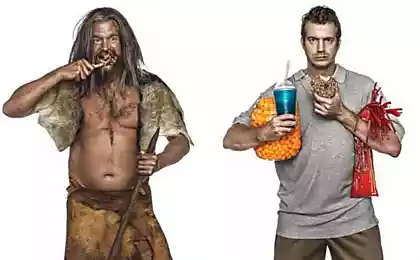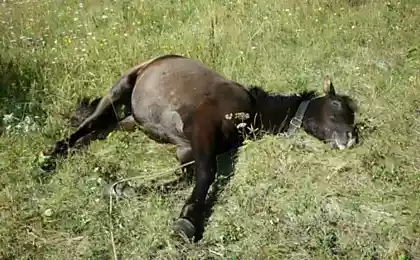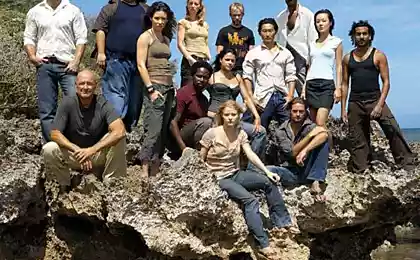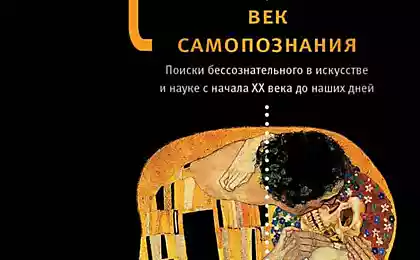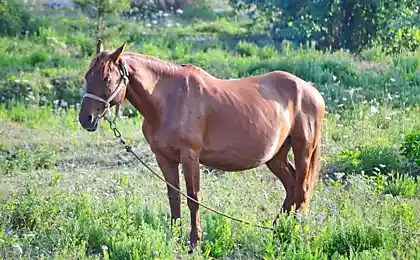756
15 amazing facts about the feasts - people who never sleep and have no concept of time
Editorial sincerely think that this is the happiest people in the world! Tribe feasts, living in the Amazon jungle, does not understand the time and knows firmly associated the concept of "stress" ... Anyway, reading these facts, you suddenly realize how much the concepts of "developed society" actually may not need a man at all .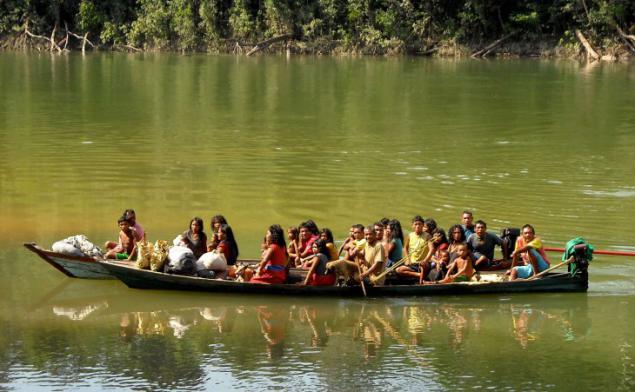
1. feasts can not count - even to one. They live here and now and make plans for the future. Past them is irrelevant. They do not know any hours or days, or in the morning or night, and even more so, of the daily routine.
2. feasts believe that sleep is harmful. First, sleep makes you weak. Secondly, in the dream as if you die and wake up a little bit the other person (in fact we are talking about changing a person with age, but the feasts do not know the concept of "age"). Third, around full of snakes!
So feasts do not sleep at night. Doze fitfully, for 20-30 minutes, leaning against the wall of a palm hut or curled up under a tree. And the rest of the time talking, laughing, master anything, dancing around bonfires and play with children and dogs.

3. change the name of the feasts every 6-7 years, and for every age they have their appropriate names, so that the name can always say, we are talking about a child, adolescent, boy, man or old man .
No calendars, time accounts and other contingent feasts do not know. So they never think about the future, they just do not know how to do it.
4. feasts not store food, they just catch it and eat (or do not get caught and do not eat, if hunting and fishing happiness they change). Feasts do not understand why there every day, and even several times. They often organize themselves fasting days, even when a lot of food in the village.
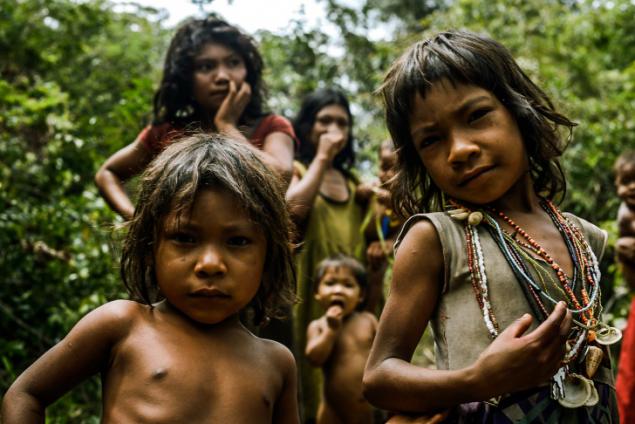
5. Language feasts unique. It has only seven consonants and three vowels. Pronouns feasts do not know and if they need to show the difference between the speech of the "I", "you" and "they" are feasts ineptly pronouns who use their neighbors, the Tupi Indians.
6. feasts do not understand the meaning of the concept of "one" for them it is a complex philosophical category. Feasts do not know the account at all costs only two concepts: "multiple" and "a lot».
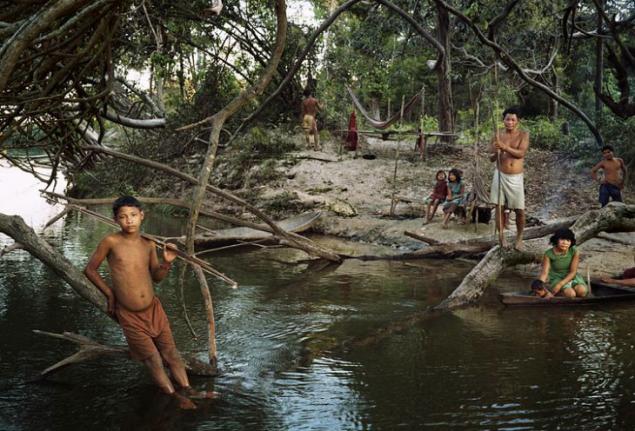
7. feasts do not understand what a shame, guilt or resentment. If Haaiohaaa dropped the fish in the water is bad. No fish, no dinner. But where does Haaiohaaa? He's just dropped the fish into the water. If a small Kiihioa pushed Okiohkiaa, it is bad because Okiohkiaa broke his leg and it should be treated. But it happened because it happened, that's all.
8. feasts know what they are like all living things - the children of the forest. In the forest inhabited by many ghosts. There go all the dead. Therefore, the forest - it's scary.
But fear feasts - it is not the fear of Europeans. When we are afraid, we feel bad. Feasts, however, consider the fear of a very strong feeling, not without properly to the charm. We can say that they are afraid of love.
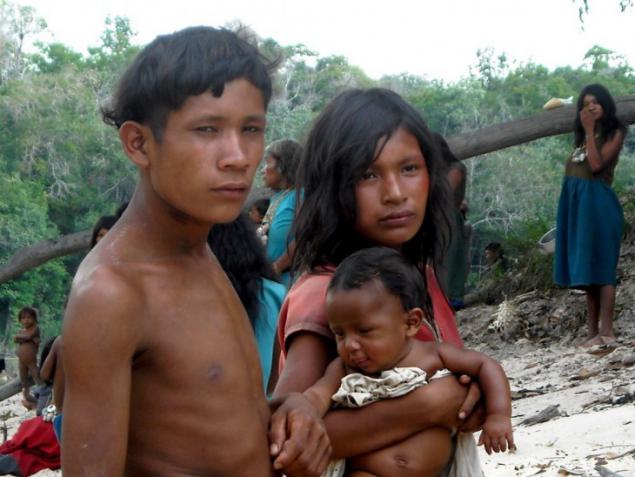
9. All of the above made it impossible target for feasts missionersoky work. The idea of one God, for example, skidded among them for the reason that the notion of "one" feasts, as already mentioned, are not compatible. Posts that someone had created, also perceived feasts puzzled. Wow, such a great and such a stupid man, but do not know how people are doing.
10. The story of Jesus Christ, translated into pirahsky too, did not look too convincing. The concept of "age", "time" and "history" for feasts - an empty phrase. Hearing about a very kind man, whom evil people nailed to the tree with nails, feasts missionary asked whether he had seen it himself. No? I did missionary person who saw this Christ? Also no? Then how can he know what it was? ..
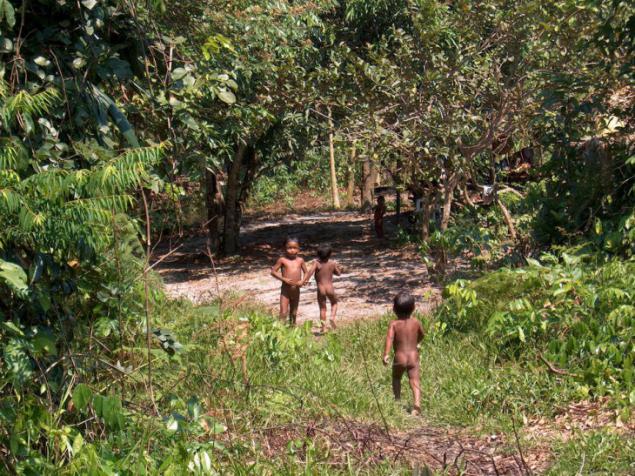
11. have little feasts concepts of kinship. Those are only three "parent", "child" and "Brother / Sister" (without any distinction of sex). Moreover, the "parent" means a grandfather, grandmother, and so on. Etc .; "Child" - his grandson, and so on. D. The word "uncle," "cousin," and so on. P. No. And since there are no words, no concepts. For example, sexual intercourse aunt and nephew is not considered incest, t. To. There is no "aunt" and "nephew».
12. At the feasts do not have any collective memory, more long than the personal experience of the oldest of the living members of the tribe. For example, modern piraha not aware of what was once a time when white people in the neighborhood did not exist, that they once came.

13. There are no feasts of art (no patterns, no body paint, no earrings or rings in the nose are not). It should be noted that children have piraha toys.
14. With all that piraha your life very happy. They consider themselves to be the most charming and attractive, and the rest - some strange subhuman. Myself, they called the word literally translated as "normal people," and all non-piraha (and whites and other Indians) - "brains on one side».
15. The first white missionaries who were sent to the feasts - Daniel Everett in 1977 - have not been able to convey to the Indian sense of his faith, and he eventually became disillusioned with Christianity and became an atheist.
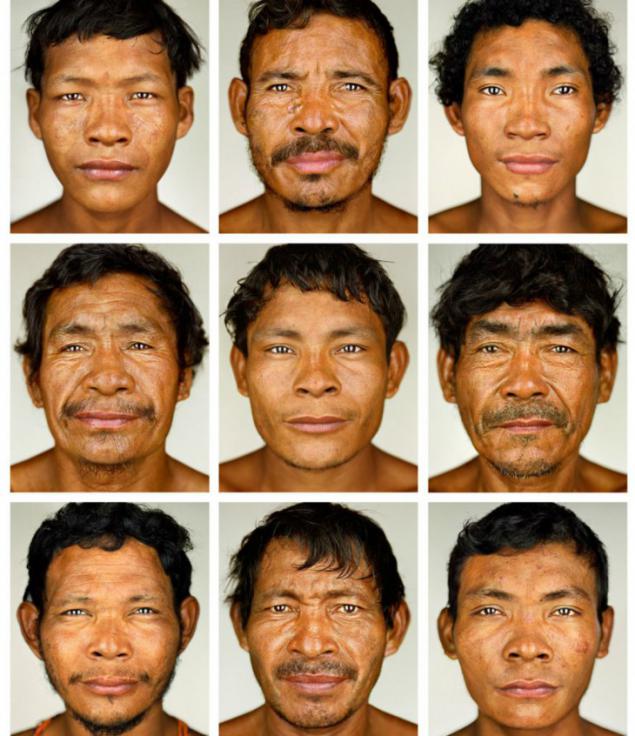
via terraoko.com/?p=95349

1. feasts can not count - even to one. They live here and now and make plans for the future. Past them is irrelevant. They do not know any hours or days, or in the morning or night, and even more so, of the daily routine.
2. feasts believe that sleep is harmful. First, sleep makes you weak. Secondly, in the dream as if you die and wake up a little bit the other person (in fact we are talking about changing a person with age, but the feasts do not know the concept of "age"). Third, around full of snakes!
So feasts do not sleep at night. Doze fitfully, for 20-30 minutes, leaning against the wall of a palm hut or curled up under a tree. And the rest of the time talking, laughing, master anything, dancing around bonfires and play with children and dogs.

3. change the name of the feasts every 6-7 years, and for every age they have their appropriate names, so that the name can always say, we are talking about a child, adolescent, boy, man or old man .
No calendars, time accounts and other contingent feasts do not know. So they never think about the future, they just do not know how to do it.
4. feasts not store food, they just catch it and eat (or do not get caught and do not eat, if hunting and fishing happiness they change). Feasts do not understand why there every day, and even several times. They often organize themselves fasting days, even when a lot of food in the village.

5. Language feasts unique. It has only seven consonants and three vowels. Pronouns feasts do not know and if they need to show the difference between the speech of the "I", "you" and "they" are feasts ineptly pronouns who use their neighbors, the Tupi Indians.
6. feasts do not understand the meaning of the concept of "one" for them it is a complex philosophical category. Feasts do not know the account at all costs only two concepts: "multiple" and "a lot».

7. feasts do not understand what a shame, guilt or resentment. If Haaiohaaa dropped the fish in the water is bad. No fish, no dinner. But where does Haaiohaaa? He's just dropped the fish into the water. If a small Kiihioa pushed Okiohkiaa, it is bad because Okiohkiaa broke his leg and it should be treated. But it happened because it happened, that's all.
8. feasts know what they are like all living things - the children of the forest. In the forest inhabited by many ghosts. There go all the dead. Therefore, the forest - it's scary.
But fear feasts - it is not the fear of Europeans. When we are afraid, we feel bad. Feasts, however, consider the fear of a very strong feeling, not without properly to the charm. We can say that they are afraid of love.

9. All of the above made it impossible target for feasts missionersoky work. The idea of one God, for example, skidded among them for the reason that the notion of "one" feasts, as already mentioned, are not compatible. Posts that someone had created, also perceived feasts puzzled. Wow, such a great and such a stupid man, but do not know how people are doing.
10. The story of Jesus Christ, translated into pirahsky too, did not look too convincing. The concept of "age", "time" and "history" for feasts - an empty phrase. Hearing about a very kind man, whom evil people nailed to the tree with nails, feasts missionary asked whether he had seen it himself. No? I did missionary person who saw this Christ? Also no? Then how can he know what it was? ..

11. have little feasts concepts of kinship. Those are only three "parent", "child" and "Brother / Sister" (without any distinction of sex). Moreover, the "parent" means a grandfather, grandmother, and so on. Etc .; "Child" - his grandson, and so on. D. The word "uncle," "cousin," and so on. P. No. And since there are no words, no concepts. For example, sexual intercourse aunt and nephew is not considered incest, t. To. There is no "aunt" and "nephew».
12. At the feasts do not have any collective memory, more long than the personal experience of the oldest of the living members of the tribe. For example, modern piraha not aware of what was once a time when white people in the neighborhood did not exist, that they once came.

13. There are no feasts of art (no patterns, no body paint, no earrings or rings in the nose are not). It should be noted that children have piraha toys.
14. With all that piraha your life very happy. They consider themselves to be the most charming and attractive, and the rest - some strange subhuman. Myself, they called the word literally translated as "normal people," and all non-piraha (and whites and other Indians) - "brains on one side».
15. The first white missionaries who were sent to the feasts - Daniel Everett in 1977 - have not been able to convey to the Indian sense of his faith, and he eventually became disillusioned with Christianity and became an atheist.

via terraoko.com/?p=95349
